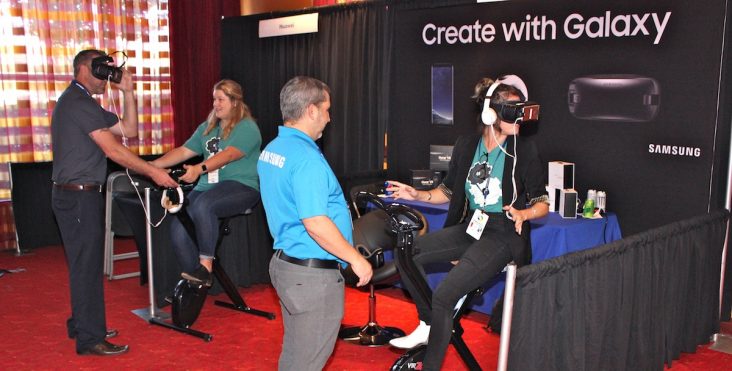Blendoor works to increase workplace diversity, reduce unconscious bias
by October 22, 2018 5:09 pm 1,474 views

Attendees check out the VR technology at the Samsung booth during the the Women In Tech conference at the John Q. Hammons Center in Rogers.
Stephanie Lampkin, founder and CEO of Silicon Valley company Blendoor, is focused on increasing diversity and reducing unconscious bias in technology companies.
Lampkin, who earned an engineering degree from Stanford and an MBA from Massachusetts Institute of Technology, was the keynote speaker Monday (Oct. 22) at the Women In Tech conference at the John Q. Hammons Center in Rogers.
The second annual The Women in Tech conference was hosted along with the first MedTech conference, and both preceded the Northwest Arkansas Technology Summit, which is set for Tuesday (Oct. 23). Nearly 3,000 people were expected to attend the events, with 600 people registered for the Women In Tech and 200 people registered for the MedTech, said Debbie Griffin, chief operating officer for the Greater Bentonville Area Chamber of Commerce.
The chamber has hosted the Technology Summit for five years, and is an effort to attract technology talent to the area, she said. The Women in Tech conference became its own event after the summit hosted a segment of events focused on women in technology that were standing room only.
Lampkin, who’s on Fortune’s 2018 40 under 40 list, has developed an app that allows job seekers to present their resumes to a prospective employer without using their pictures or names.
“It’s focused on not just removing name, ethnicity, etc., but figuring out how to build machine learning algorithms that are optimized to identify top talent in ways that we may not even know,” she said. “There may be other signals that we’re unware of that are correlated to someone’s success in the world, and the only way that we uncover that is having diverse datasets and optimizing and ensuring that we’re not bringing in human bias into the algorithms that we are building.”
Over the past 50 years, people’s friend groups have become more homogenous, and people’s personal behaviors often carry over into one’s work life, she said. She showed a video of a man who’s name was Jose, and how he wasn’t receiving any job offers after he applied to hundreds of companies. But when he changed his name to Joe and used the same resume, he started to see feedback from prospective employers within a week.
Lampkin said the concept of blind recruiting isn’t new as people might go behind a curtain and go barefoot in order for recruiters to not hear the heels or shoes one was wearing. This alone reduces gender diversity by five times, she said. A more recent means of blind recruiting is how contestants are selected on TV show “The Voice.”
She also spoke about a virtual reality technology that allows people to experience being a woman in the workplace and how messaging can influence how people do on tests, such as saying boys do better on math tests negatively impacts how girls perform on the tests.
But she said unconscious bias isn’t about men versus women, and in TV show “Entrepreneur Elevator Pitch” Lampkin was called into the boardroom after giving her 60-second pitch and receiving support from the men but not the women. She had asked for $1.5 million in seed money, but the executives in the show decided to not invest into her company after they couldn’t agree. The men wanted to invest while the women didn’t, citing too many companies working in the field. She also showed an interview of Warren Buffett and how he explained he would not have been successful if he were a woman.
Lampkin said her company works with Fortune 500 technology companies that are making investments into diversity. Clients include Salesforce, Google, Airbnb and Amazon. The company also publishes the BlendScore report, which uses data to determine the diversity strength of companies.
When asked how successful the company has been in eliminating bias, she said, with Salesforce, the company increased gender diversity by two times and ethnic diversity by six times in terms of the candidates receiving a job offer.
With regard to opportunities available to Arkansans, Lampkin showed an Opportunity Nation report and how the state ranks 43rd on the opportunity index. When asked what Arkansas needs to do to improve opportunities and workplace diversity, she explained that job seekers and employees need to become more diverse in their skills and not just rely on employers to train them. It’s up to the employee or job seeker to receive a diverse set of skills.
